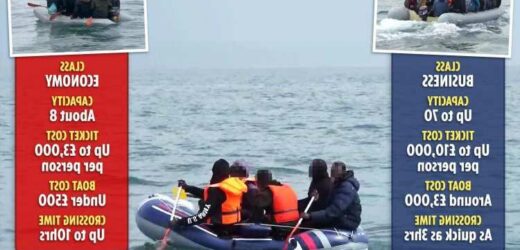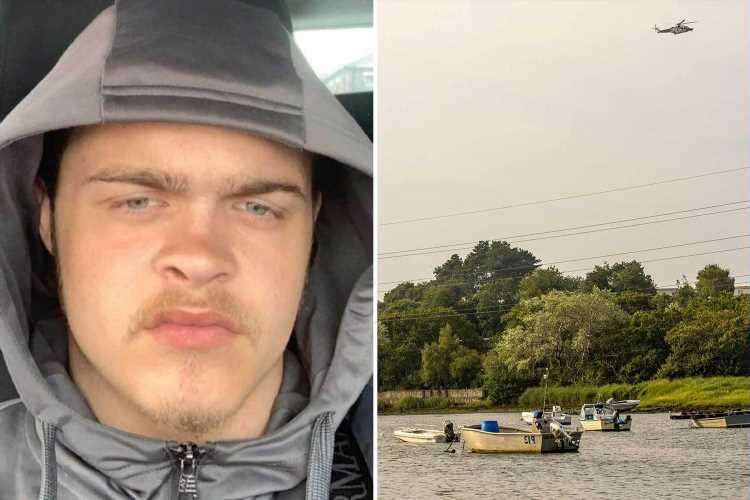A NEW wave of migrants risking their lives crossing the Channel is being fuelled by a two-tier pricing system — dubbed “economy and business class”.
Some are understood to have paid round £3,000 a head to row themselves through the treacherous waters in the “economy class” dinghies that take ten hours of paddling.
To secure a place in engine-propelled boats, they have to cough up £10,000 each and make the 21-mile “business class” crossing in just three hours.
On Sunday, one over-inflated small dinghy was shadowed by French patrol boat P618 Escaut for part of its journey.
The vessel appeared to make no effort to stop or attempt to rescue the fatigued men who were finally picked up by a UK vessel and taken to Dover, Kent, after being spotted by Brit fishermen.
Tim Loughton MP, a member of the Home Affairs Select Committee, fumed: “The French are complicit in allowing such a dangerous boat to cross the Channel.
“That craft isn’t seaworthy and, if migrants are in peril or looking like they may soon be in peril, they are under obligation to apprehend it, for the French to say they have no power to stop boats is rubbish.”
'BUSINESS CLASS' CROSSING
In the past six years, Britain has handed France £196million to combat illegal immigration.
That figure includes the £54million announced by Home Secretary Priti Patel last week to pay for a doubling in the number of French police officers on the beaches to 200 a day, extra intelligence-gathering and increased surveillance by drones and CCTV.
The number of migrants arriving by small boat has spiralled from just 299 in 2018 to 1,835 in 2019 and more than 9,250 so far this year.
Support charities said some 2,500 more migrants are waiting in northern France to cross this summer.
Border Force staff are being switched from airports to the crisis in the English Channel as Ms Patel insists she has an “unwavering determination” to stop the crossings.
There are fears the move could leave airports stretched, creating longer queues in holiday season.
The fishing party that chanced upon the death-trap craft as it crossed shipping lanes on Sunday lunchtime, alerted the authorities. The dinghy was part of a ramshackle migrant flotilla of 12 boats carrying 378 people that reached UK waters that day.
Matt Coker, 41, skipper of the fishing vessel Royal Charlotte, said five rowers — with only three wearing life jackets — were spotted eight miles off Folkestone, Kent.
He said: “They were in a massively over-inflated child’s dinghy. It was ready to burst. It was an overloaded beach dinghy.”
Those pictured arriving in Dover Marina on Sunday from a variety of boats included a small child with a dummy in their mouth and a woman helped ashore in a wheelchair.
MIGRANT NUMBERS ROCKETING
Mr Coker explained: “There is a big difference in the modes of transport — economy and business class if you like.”
His Royal Charlotte also spotted one of the new ‘super-dinghies’, a military-style rib with some 26 migrants on board which was seen powering over the 21 miles.
At 22ft long, it was carrying some 26 migrants with some using motorcycle inner tubes as life jackets. It had been shadowed into British waters by the French vessel Abeille Languedoc and its occupants were later rescued by UK authorities.
Mr Coker added: “I’ve looked at these new large dinghies in Dover harbour and they appear to have been especially-built to be used once.
“They are home-made with glued seams rather than stitching. They haven’t got any certification marks or name plates on them. They have a plywood floor which isn’t even varnished.”
One UK boat manufacturer suggested the smugglers may be having the new super-dinghies produced to order cheaply in China.
The Sun also has evidence people smugglers are using boats from a German supplier. Under the Nationality and Borders Bill before Parliament, it will become a criminal offence to illegally travel to the UK.
Those attempting to enter could be jailed for four years. Ms Patel said: “The British public should be in no doubt of our unwavering determination to stop these dangerous crossings from safe EU countries and take down the evil criminal gangs behind them.”
The French have tried to deploy drones to hunt migrants but this plan has been hampered by strict privacy laws in the country.
Authorities in France admit that their task is a near-impossible one. But they have had some successes in tackling the trade.
On Sunday, authorities there prevented 178 migrants from crossing in five boats — and the number of migrants caught by France before they enter the sea has trebled on last year’s figures to more than 7,500.
But Tony Smith, the former boss of Border Force, said: “There is no reason under international maritime law that the French and the British could not agree a treaty.
"We could work together to stop dangerous crossings but the French are not prepared to take that step, no matter how much money we give them.”
Source: Read Full Article






